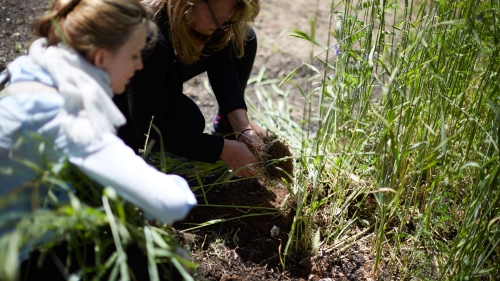

Raul Lejano is a scholar in public policy, environment, and collective action, whose foremost interests involve understanding people’s deep engagements with community and environment, and in how we might design policies and institutions from a relational perspective. His work on climate justice and urban sustainability involves increasing resilience in vulnerable communities to risks from extreme weather events and environmental health risks. His research suggests strategies for reforming environmental governance around an ethic of care. Current projects include studying adapting to extreme weather in developing nations --e.g., empowerment workshops at Rohingya refugee camps in Bangladesh, enacting a relational model of risk communication, and exploring high-definition virtual simulations for flood risk communication.
Beginning with his first book, Frameworks for Policy Analysis: Merging Text and Context (Routledge), he has developed approaches for integrating multiple analytical lenses in interpreting environmental situations. In his (co-authored) book, The Power of Narrative in Environmental Networks (MIT Press), a theory is advanced regarding the unique capacity of narrative to capture complex human motivations and human-nonhuman relationships. The theory is further developed in his recent (co-authored) book, The Power of Narrative: Climate Skepticism and the Deconstruction of Science (Oxford Univ. Press)*. His newest books are entitled Caring, Empathy and the Commons: A Relational Theory of Collective Action (Cambridge Univ. Press) and a co-authored work entitled Relationality: The Inner Life of Public Policy (Cambridge Univ. Press).
His work in the area of environmental policy emphasizes how ecological knowledge and action emerge from the capacity of a person to build relationships with the other. Since people’s motivations are never merely utilitarian or affective or deontological, policies cannot be so simplistically designed. As an example, cities need to be analyzed not merely in objective terms but as a web of relationships. His latest work involves the role of narrative and relationality in moving people to act on (or disregard) climate change. Lejano received his doctorate in Environmental Health Science in 1998 from UCLA, and held faculty appointments at MIT, UCI, and HKU before coming to NYU. As a doctoral student, he worked with the Nobel laureate, Lloyd Shapley.
* American Association for Applied Linguistics, Book of the Year 2022: The Power of Narrative
Selected Publications
Most Recent Publications (10 Years)
- Lejano, R. P. and W. S. Kan (2025). "Conjectures on a relational turn in policy studies," Policy Sciences. https://link.springer.com/article/10.1007/s11077-025-09574-9
- Lejano, R. P. and W. S. Kan (2025). Interpretive Policy Analysis: Hermeneutics for our Times, Springer. https://link.springer.com/book/10.1007/978-3-031-83900-9
- Kan, W. S., Lejano, R. P., & Wong, Y. C. (2025). Social work-led case management in Hong Kong: A relational analysis. International Social Work, 0(0). https://doi.org/10.1177/00208728251382821
- Zhu, J., Laefer, D. F., Lejano, R. P., Gmelch, P., O'Keeffe, E., & Chandna, K. (2025). From 2D to 3D: Flood risk communication in a flood-prone neighborhood via dynamic, isometric street views. Progress in Disaster Science, 100419.
- Nero, S., & Lejano, R. (2025). Narrative analysis: The ideological dimensions of climate discourse. In Routledge Handbook on Climate Crisis Communication (pp. 77-88). Routledge.
- Lejano, R. P. and D. Stokols (2024). "Social ecological systems in flux," Annual Review of Sociology. https://doi.org/10.1146/annurev-soc-083023-034136
- Lejano, R. P., & Kan, W. S. (2024). "The relational dimensions of collective action," Planning Theory and Practice, 25(3), 413-419.
- Zhu, J., & Lejano, R. (2024). A relational approach to risk communication. In Oxford Research Encyclopedia of Natural Hazard Science. doi: https://doi.org/10.1093/acrefore/9780199389407.013.453
- Lejano, R. P. (2023). Caring, Empathy, and the Commons: A Relational Theory of Collective Action, Cambridge University Press, Cambridge. https://doi.org/10.1017/9781009003353
- Kan, W. S., & Lejano, R. P. (2023). "Relationality: The role of connectedness in the social ecology of resilience," International Journal of Environmental Research and Public Health, 20(5), 3865.
- Lejano, R. P. and Kan, W. S. (2022). Relationality: The Inner Life of Public Policy, Cambridge University Press, Cambridge (open access) https://www.cambridge.org/core/elements/relationality/609FF3DF88BCADAA726208EE3E6F536E.
- Lejano, R. P. and Kan. W. S. (2022). "IPCC and the city: The need to transition from ideology to climate justice," Journal of Planning Education & Research, 44(3), 983-990. https://journals.sagepub.com/doi/full/10.1177/0739456X221105798
- Lejano, R. P., Rahman, M. S., Kabir, L., & Urrutia, I. (2022). "Perspectives from the Field: Evaluation of a Relational Model of Risk Communication in the Context of Extreme Weather". Climate Risk Management. https://www.sciencedirect.com/science/article/pii/S2212096322000511
- Lejano, R. P. et al. (2022). "Design and implementation of a relational model of risk communication", Disaster Prevention and Management. https://doi.org/10.1108/DPM-07-2022-0153
- Haque, A., Haider, D., Rahman, M.S., Kabir, L., and R.P. Lejano (2022). "Building Resilience from the Grassroots: The Cyclone Preparedness Programme at 50," Int. J. of Environ. Res. Public Health, 19(21), 14503. https://doi.org/10.3390/ijerph192114503
- Lejano, R. P. (2021). "Relationality: An alternative framework for analyzing policy," Journal of Public Policy 41(2), 360-383.
- Lejano, R. P., Haque, C. E., & Berkes, F. (2021). "Co-production of risk knowledge and improvement of risk communication: A three-legged stool," International Journal of Disaster Risk Reduction, 102508.
- Casas Jr, E. V., Pormon, M. M., Manus, J. J., & Lejano, R. P. (2021). Relationality and resilience: Environmental education in a time of pandemic and climate crisis. The Journal of Environmental Education, 52(5), 314-324.
- Lejano, R. P., & Stokols, D. (2021). "Analytics for local knowledge: Exploring a community’s experience of risk." Journal of Risk Research, 24(7), 833-852.
- Kan, W. S., & Lejano, R. P. (2021). "How land use, climate change, and an ageing demographic intersect to create new vulnerabilities in Hong Kong." Land, 10(4), 391.
- Lejano, R. P., Nam, K. M., Heise, S., & Hooda, P. S. (2021). "Emerging issues regarding the intersection of climate, toxic substances, and environmental health." Frontiers in Environmental Science, 9, 743267.
- Lejano, R. and S. Nero (2020). The Power of Narrative: Climate Skepticism and the Deconstruction of Science, Oxford University Press, Oxford and New York.
- Lejano, R. P., Rahman, M. S., & Kabir, L. (2020). "Risk communication for empowerment: Interventions in a Rohingya refugee settlement," Risk Analysis https://doi.org/10.1111/risa.13541
- Lejano, R., W.S. Kan, and C.C. Chau (2020). "The hidden disequities of carbon trading: Carbon emissions, air toxics, and environmental justice," Frontiers in Environmental Science 8(4):1.
- Lejano, R. P., Casas, E., Pormon, M. M., & Yanger, M. J. (2020). "Teaching to the nth: Narrative knowledge and the relational model of risk communication," International Journal of Disaster Risk Reduction, 101720.
- Lejano, R. (2019). "Ideology and the narrative of climate skepticism," Bulletin of the American Meteorological Society, 100(12):ES415-ES421..
- Lejano, R. P. (2019). "Relationality and social–ecological systems: Going beyond or behind sustainability and resilience." Sustainability, 11(10), 2760.
- Lejano, R. P., & Li, L. (2019). "Cooperative game-theoretic perspectives on global climate action: Evaluating international carbon reduction agreements." Journal of Environmental Economics and Policy, 8(1), 79-89.
- Lejano, R. (2018). "Climate change and the relational city." Cities. 85:25-29.
- Lejano, R. et al. (2018). A Phenomenology of Institutions: Relationality and Governance in China and Beyond. Routledge, New York.
- Lejano, R. P., Casas Jr, E. V., Montes, R. B., & Lengwa, L. P. (2018). "Weather, climate, and narrative: A relational model for democratizing risk communication," Weather, Climate, and Society, 10(3),579–594.
- Lejano, R. and C. Del Bianco (2018), "The logic of informality: Pattern and process in a Sao Paulo favela," Geoforum 91:195-205.
- Lejano, Raul (2017). "Assemblage and relationality in social-ecological systems," Dialogues in Human Geography 7(2):192-196.
- Lejano, R. and J. Dodge (2017). "The narrative properties of ideology: The adversarial turn and climate skepticism in the U.S.", Policy Sciences 50(2), 195-215.
- Lejano, R. and E. Gonzalez (2017). "Sorting through differences: The problem of planning as reimagination," J. of Planning Education & Research 37(1):5-17.
- Taufen Wessels, A. and R. Lejano (2017). "Urban waterways and waterfront spaces: Social construction of a common good," Journal of the Southwest 59(1/2):106-132.
- Lejano, R. and R. Funderburg (2016). "Geographies of risk, the regulatory state, and the ethic of care," Annals of the American Association of Geographers 106(5):1097-1110.
- Lejano, R., J. Tan, and M. Wilson (2016), "A textual processing model of risk communication: Lessons from Typhoon Haiyan," Weather, Climate, and Society 8(4):447-463.
